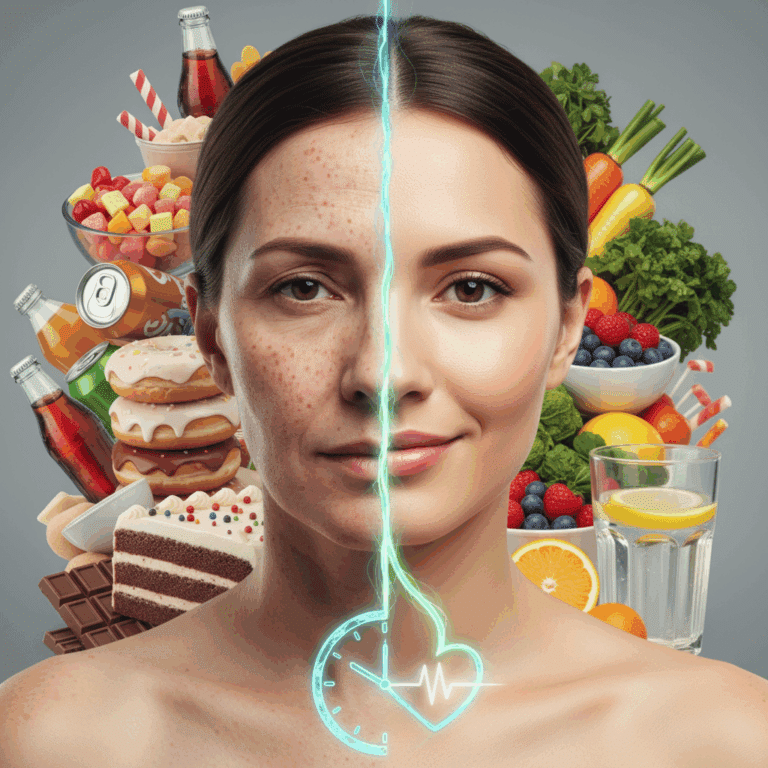Effects of Sugar on Skin Biology
The consumption of excessive sugar triggers complex changes in skin biology, impacting its structure and function. These effects mainly arise from biochemical reactions that compromise skin integrity and appearance.
Understanding how sugar interacts with key components of the skin helps reveal why high sugar intake accelerates aging and exacerbates skin conditions. This knowledge empowers individuals to make informed dietary choices for healthier skin.
Glycation and its Impact on Collagen and Elastin
Glycation is a process where sugar molecules bind to collagen and elastin fibers, essential proteins for skin strength and elasticity. This bonding weakens these fibers, leading to loss of firmness and the appearance of wrinkles.
As glycation progresses, the skin becomes more prone to sagging and diminished resilience. The damage caused is largely irreversible, highlighting the importance of managing sugar intake to protect skin structure.
By limiting sugar consumption, glycation slows down, helping maintain collagen and elastin function. This preservation is crucial for keeping skin youthful and supple over time.
Inflammation and Skin Conditions Linked to Sugar
Excess sugar intake promotes systemic inflammation, which directly affects the skin’s health. Inflammatory responses contribute to conditions like acne, rosacea, and eczema, intensifying redness and irritation.
High blood sugar levels stimulate the release of pro-inflammatory chemicals, worsening skin sensitivity and hampering its natural healing processes. Reducing sugar intake can mitigate these inflammatory effects.
Managing sugar consumption benefits those prone to skin flare-ups, improving overall skin tone and decreasing the frequency of breakouts and redness.
Benefits of Reducing Sugar Intake for Skin
Reducing sugar intake offers significant benefits for skin health, contributing to improved firmness and hydration. Lower sugar levels minimize harmful processes that degrade skin structure.
With less sugar, the skin’s natural barrier strengthens, promoting healing and reducing inflammation. This leads to a clearer complexion with fewer irritations and blemishes.
Improved Skin Firmness and Hydration
Lower sugar consumption reduces glycation, preserving collagen and elastin fibers crucial for firm, elastic skin. This results in a more youthful appearance.
In addition, decreased sugar helps the skin retain moisture more effectively, enhancing hydration and giving the skin a plumper, healthier look.
Improved hydration also helps skin resist environmental stressors, maintaining softness and preventing dryness caused by excessive sugar intake.
Reduction in Acne, Redness, and Irritations
Cutting back on sugar lowers inflammation, directly reducing acne flare-ups and skin redness commonly linked to high sugar diets. This improves overall skin clarity.
Many notice fewer breakouts and less irritation within weeks of reducing sugar, as the skin’s inflammatory responses calm down significantly.
Balanced oil production also results from reduced sugar, minimizing shine and visible pores, which further supports clearer skin.
Strengthened Skin Barrier and Enhanced Healing
Decreasing sugar intake boosts the skin’s protective barrier, enhancing its ability to defend against environmental damage and pollutants effectively.
A stronger barrier aids in quicker skin repair, accelerating healing processes and reducing vulnerability to infections and irritations.
These improvements contribute to a smoother, more resilient complexion that maintains health even under external stress.
Prevention of Premature Aging Through Lower Sugar
Lowering sugar intake plays a crucial role in preventing premature skin aging by slowing down damaging processes like glycation. This preserves essential proteins for youthful skin.
Reducing sugar limits wrinkle development and supports overall skin vitality. The skin remains more elastic, firm, and less prone to fine lines, promoting a healthier, younger appearance.
Preservation of Collagen and Delay of Wrinkles
Excess sugar accelerates collagen breakdown through glycation, causing the skin to lose firmness and develop wrinkles early. Lower sugar slows this degradation, maintaining skin strength.
By preserving collagen, reduced sugar intake delays wrinkle formation, helping maintain skin’s smooth texture and elasticity. This keeps the complexion looking youthful for longer.
Consistent control of sugar consumption supports long-term collagen health, which is vital for preventing premature sagging and aging signs.
Increased Skin Hydration and Resistance
Reducing sugar enhances the skin’s ability to retain moisture, leading to improved hydration levels. Well-hydrated skin appears plumper and more radiant.
Improved hydration also strengthens the skin’s resistance against environmental aggressors, reducing damage from pollutants and UV exposure.
With better moisture retention and a fortified barrier, the skin becomes more resilient, slowing down dryness and irritation linked to high sugar intake.
Overall Health Improvements from Lower Sugar Consumption
Reducing sugar intake supports better hormonal balance, which plays a key role in maintaining skin health and overall metabolic functions. This helps regulate insulin and stress hormones effectively.
Improved metabolic health lowers the risk of chronic diseases, supporting clearer, more vibrant skin by reducing inflammation and oxidative stress throughout the body.
Hormonal Balance and Metabolic Health
High sugar consumption disrupts hormones such as insulin, potentially causing imbalances that worsen skin issues like acne and inflammation. Lowering sugar intake helps restore balance.
Improved hormonal regulation also supports stable blood sugar levels, reducing metabolic strain that can accelerate skin aging and contribute to poor skin quality.
Balanced hormones contribute to better energy metabolism, which in turn supports skin repair and renewal processes, promoting a healthier overall appearance.
Boosted Immunity and General Well-being
Cutting down on sugar strengthens the immune system, enhancing the body’s ability to fight infections and reducing skin-related issues caused by immune dysfunction.
Lower sugar intake reduces systemic inflammation, which benefits both mental and physical well-being, resulting in a more radiant complexion and greater vitality.
Overall, a reduced sugar diet supports healthy gut flora and nutrient absorption, which are essential for maintaining skin health and holistic wellness.






